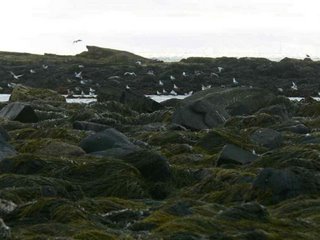 The Maine coast is a favorite of mine, especially in the early morning hours when beach travelers are minimal and the tide is taking it's last breath at being "low". Today was especially good because the beach was inactive and save for a black spotted-on-white Great Dane which the owner said was less than friendly, I was in my own company when I headed out onto the peninsula.
The Maine coast is a favorite of mine, especially in the early morning hours when beach travelers are minimal and the tide is taking it's last breath at being "low". Today was especially good because the beach was inactive and save for a black spotted-on-white Great Dane which the owner said was less than friendly, I was in my own company when I headed out onto the peninsula.The ocean floor at low tide is like a flower garden to me. It's decorated with a variety of plants and although the ocean colors are more subdued here in the north, there is a variety of plants to see, touch and smell. I've never spent much time learning ocean plant names as I have no one to share the knowledge with. One rock weed probably smells the same to me as to the next gardener and they each have a protective coating which feels similar.
In my brief lifetime, the ocean has changed a great deal. The changes are obvious and they continue in less than favorable contrast to what I enjoyed in my youth. My trips to Calves Island in Long Island Sound, trips to dig clams or trap crabs, or fishing adventures with my grandfather for flounders--these are all memories of a different time and a "different" ocean. Many places where I was taught to dig clams are no longer open to the public because of contamination. Some of the best waters for crabs are now closed areas belonging to wildlife sanctuaries. That is good.
In early June of this year, I stopped at some beaches 25 miles north of Wells, Maine. I was struck by the amount of trash which had been left from the previous year. I soon emptied a collection of razor clam shells back onto the sand so I could have the plastic bag in which to pack trash. Before going too far I reorganized my collection format and only picked up broken glass and sharp bottle caps. When young I had been taught to scour the sands before leaving at the end of the day but that training has absented itself from beach travelers over the recent years.
Today I reflected on previous trips to Maine just after Labor Day. One visit about ten years ago we arrived to find thousands upon thousands of sand dollars at low tide. The following day was extremely hot and the beach was crowded but still, sand dollars remained everywhere. This June, the bluefish were so thick that surf casters made great harvests and those fishing from the breakwater at Camp Ellis pulled in some beauties. Yet another memory.
As I walked carefully out onto the peninsula, I passed a beat up lobster trap. It was yellow coated wire, flat and rectangular shaped, lodged securely between two rocks and pecked clean of bait by marauding gulls. It was new, not made by hand with a wooden frame and it lacked a handwoven bait bag. Mussles were so noticeably absent it bothered me enough to make me walk to a rock edge and pull back some rock weed in hopes of finding some telltale blue shells. There were none. A single shell here or there, isolated by weed and rocks, gave notice that things have changed.
Snails. Snails. Snails are everywhere. They coat rocks and the open areas between mounds of rock weeed. They don't seem to move but just wait patiently for the tide to return with fresh water to recirculate for their next meal. Things have changed.
I walked off the peninsula and scuffled through the thick piles of seaweed. There is a name for this collection of debris but it escapes me. I looked for starfish but there were none. I made a methodical search through three square feet of weed and found nothing of great interest. As I headed back down the beach, I found one, two, three, then a fourth small sea urchin. Three were still alive so I hid them under the weed debris away from the gulls. The forth, long since expired and totally missing from the shell caused no grief when I decided to bring it back with me. Finding four alone might be a good sign or might be a poor sign. If draggers are trying to bring them up from the bottom to sell at restaurants, more serious damage to the ecosystem might be taking place.
After walking a bit I walked into the ocean. It was warmer than I had ever remembered. I had listened to a radio program along the way which suggested that temperatures have changed 4 degrees this year. I thought about it and hoped the numbers were wrong. A recent NASA studied documented that winter sea ice to the northern cap is melting quicker than ever before. That change influences the growth of sea plankton which is at the start of the food chain for all ocean life. Yes, the oceans are changing and not all for the better.
I returned to where I had left my knapsack and then I headed back to the truck. My walk along the ocean was like a walk through my gardens in Vermont. Beauty abounds and there is more to learn each step of the way. My walk left me with many questions, but I left in the company of peace.
From the Maine coast, where dropping a piece of cracker encourages airborne visitors to arrive and offer a bad scolding.
Your gardening friend from Vermont,
George Africa
http://vermontflowerfarm.com
No comments:
Post a Comment